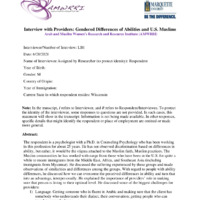LB1
Item
-
Title
-
LB1
-
Type
-
Interview
-
Date
-
June 28th, 2021
-
Description
-
The respondent is a psychologist with a Ph.D. in Counseling Psychology who has been working in this profession for about 25 years. He has not observed discrimination based on differences in ability, but rather, it would be the stigma attached to the Muslim faith, Muslim practices. The Muslim communities he has worked with range from those who have been in the U.S. for quite a while to recent immigrants from the Middle East, Africa, and Southeast Asia (including immigrants from Myanmar). He discussed the suffering experienced by these groups and made observations of similarities and differences among the groups. With regard to people with ability differences, he discussed how we can overcome the perceived differences in ability and turn that into an advantage, interpersonally. He explained the importance of providers’ role in making sure that person is living to their optimal level. He discussed some of the biggest challenges for providers:
1) Language. Getting someone who is fluent in Arabic and making sure that the client has somebody who understands their dialect, their conversation; getting people who can translate properly for us.
2) Transportation. Many of our clients, including those with ability differences, need transportation so they can have access to medical services.
In terms of additional support or changes in attitude that are needed, the respondent replied that he would start with education.
“…if folks who have been educating, formulating the brains of new providers in the field, firing up the engine of excitement to serve, and really seeing that those who come to serve — whether they are journalists or social workers, doctors, nurses, translators, whatever profession that person is bringing to the table — they are bringing up the motivation to serve the person regardless of their background. Regardless of the prejudices that may be there. And most importantly for the provider to understand their own biases and make sure they are not a part, and do not linger in service delivery.”
Secondly, creating opportunity. “Creating opportunity for those that may be disadvantaged
but deserve the chance to be heard, to express themselves, as we know that folks who have
differences in abilities end up having barriers to access. Access to care, but also access to
having a chance in life.”
-
Language
-
English
-
Subject
-
Faith-based discrimination against Muslims in Wisconsin and the U.S., Torture, trauma, PTSD, Language barriers to accessing proper and adequate care, Need for high quality translators who are culturally sensitive, The necessity of culturally-sensitive psychological services and providers, Strength in community bonds and partner programs as a refuge against prejudice, Disability
 LB1
LB1